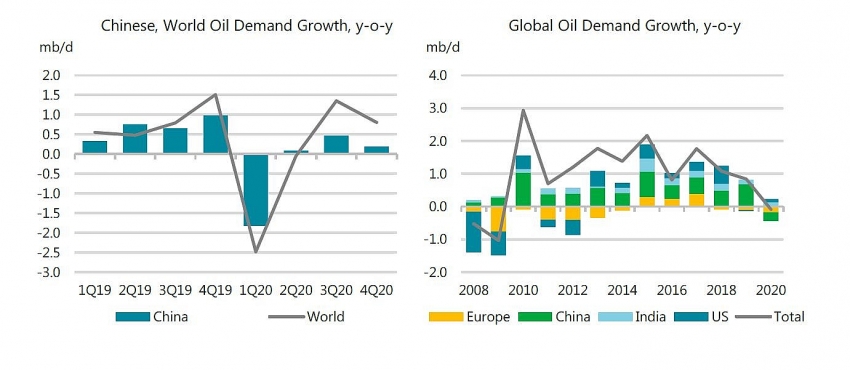Coronavirus to take global oil demand down a peg
 |
| The IEA forecasts global oil demand to decline because of the coronavirus outbreak. Source IEA |
This is the main content of the latest oil market forecast released by the International Energy Agency (IEA). Global oil demand has been hit hard by the novel coronavirus (COVID-19) and the widespread shutdown of China’s economy.
The IEA now sees global oil demand at 99.9 million barrels a day in 2020, down around 90,000 barrels from 2019. This is a sharp downgrade from the IEA’s forecast in February, which predicted that global oil demand would grow by 825,000 barrels a day in 2020.
The short-term outlook for the oil market will ultimately depend on how quickly governments move to contain the coronavirus outbreak, how successful their efforts are, and what lingering impacts the global health crisis has on economic activity.
To account for the extreme uncertainty facing energy markets, the IEA has developed two other scenarios for how global oil demand could evolve this year. In the more pessimistic case, global measures fail to contain the virus and global demand falls by 730,000 barrels a day in 2020. In the more optimistic case, the virus is contained quickly around the world and global demand grows by 480,000 barrels a day.
The impact of the coronavirus on oil markets may be temporary but the longer-term challenges facing the world’s suppliers are not going to go away, especially those heavily dependent on oil and gas revenues, according to the IEA.
The medium-term market report also considers the impact of clean energy transitions on oil market trends. Demand growth for gasoline and diesel between 2019 and 2025 is forecast to weaken as countries around the world implement policies to improve efficiency and cut CO2 emissions – and as electric vehicles increase in popularity. The impact of the energy transition on oil supply remains unclear, with many companies prioritising short-cycle projects for the coming year.
For Vietnam, falling world prices and demand would slash the budget, but it could potentially boost consumer spending and help businesses trim costs, which may in turn stimulate local consumption and production.
More generally, Vietnamese officials have emphasised that the country is now much less reliant on oil exports for revenue than it was before, with the current less than 10 per cent a far cry from the previous 20-25 per cent rate.
What the stars mean:
★ Poor ★ ★ Promising ★★★ Good ★★★★ Very good ★★★★★ Exceptional
Related Contents
Latest News
More News
- NAB Innovation Centre underscores Vietnam’s appeal for tech investment (January 30, 2026 | 11:16)
- Vietnam moves towards market-based fuel management with E10 rollout (January 30, 2026 | 11:10)
- Vietnam startup funding enters a period of capital reset (January 30, 2026 | 11:06)
- Vietnam strengthens public debt management with World Bank and IMF (January 30, 2026 | 11:00)
- PM inspects APEC 2027 project progress in An Giang province (January 29, 2026 | 09:00)
- Vietnam among the world’s top 15 trading nations (January 28, 2026 | 17:12)
- Vietnam accelerates preparations for arbitration centre linked to new financial hub (January 28, 2026 | 17:09)
- Vietnam's IPO market on recovery trajectory (January 28, 2026 | 17:04)
- Digital economy takes centre stage in Vietnam’s new growth model (January 28, 2026 | 11:43)
- EU Council president to visit Vietnam amid partnership upgrade (January 28, 2026 | 11:00)

 Tag:
Tag:




















 Mobile Version
Mobile Version